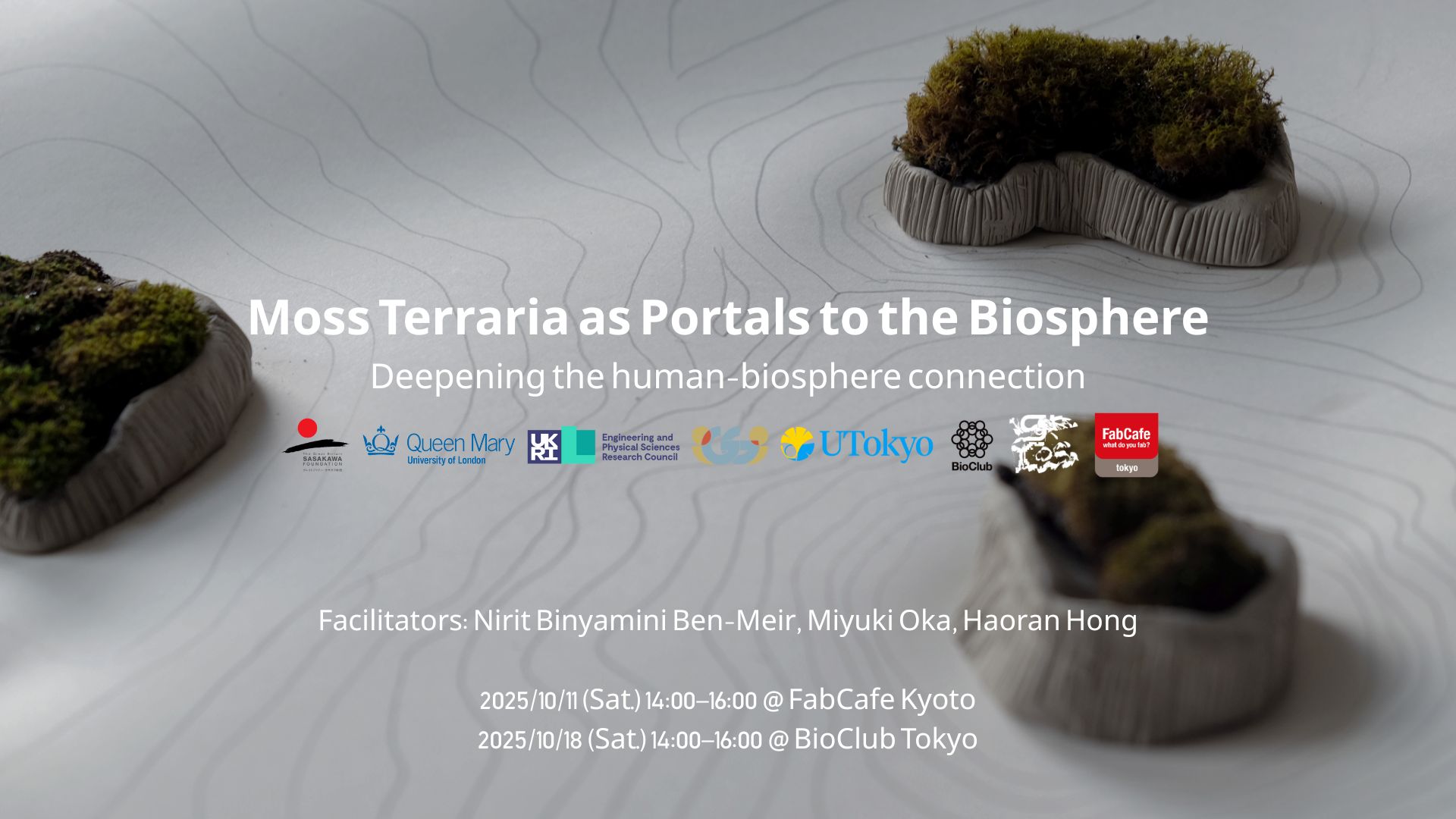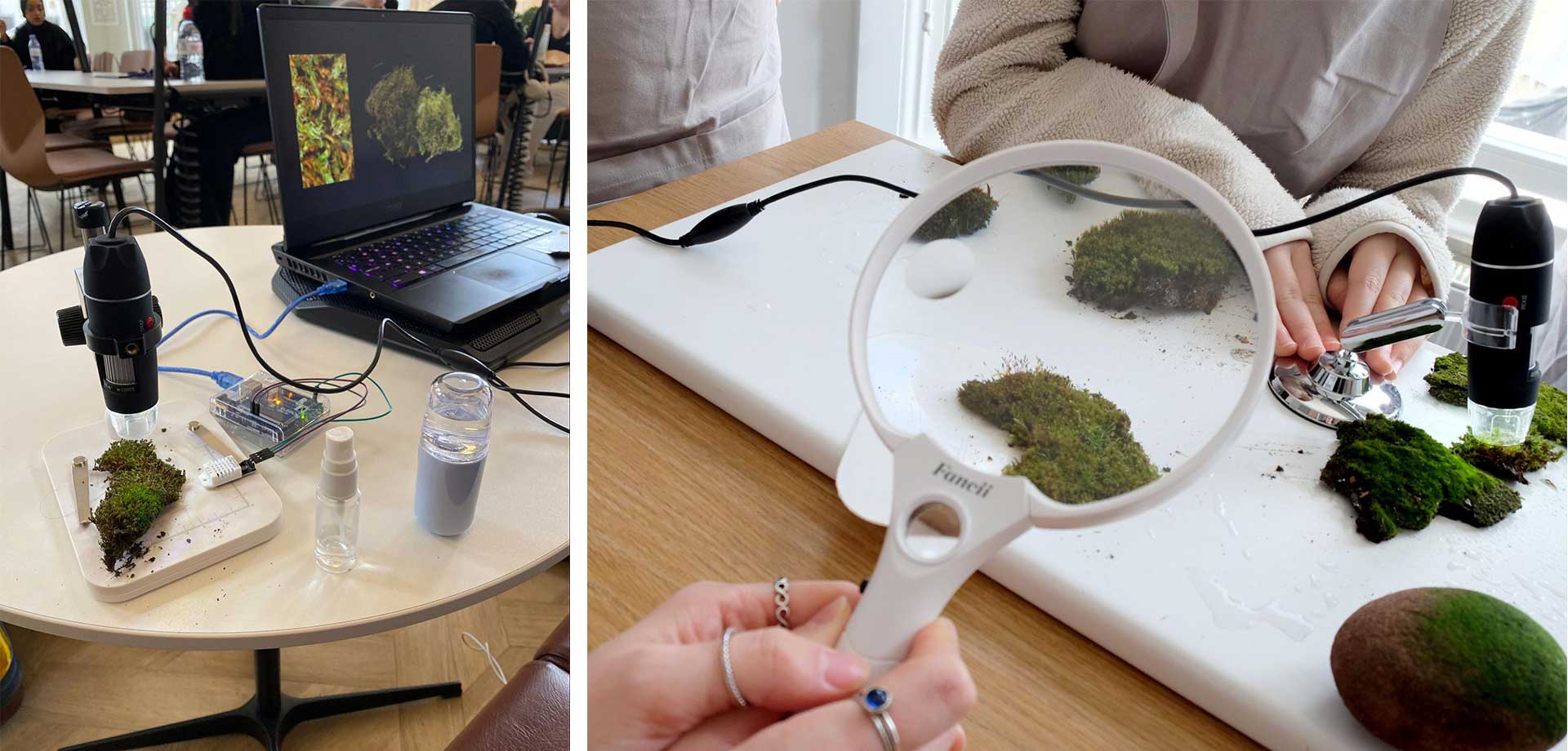Workshop
- #Finished
- #英語で開催

Join us and explore ways to deepen our connection with and awareness of non-human species through moss. We will experiment with technical tools, as well as imagine how networks of terraria could provoke people to live in closer harmony to the biosphere. Through this process, we'll offer fresh perspectives on the relationship between nature, technology, and humanity.
Sat, October 18, 2025 UTC+09:00
14:00 – 16:00 * Doors open at 13:45
Please order a drink from FabCafe Tokyo on the day of the event.
This workshop invites people to explore the world of mosses and how the integration of moss plants into interactive artefacts and experiences could promote ecological awareness and connection to the biosphere. Mosses are incredibly resilient plants, and have a unique ability to adapt to changes in their environment. Together, we will explore how technological tools, visual and sound design can amplify the subtle responses of mosses, making them more perceptible to human senses. We will imagine, sketch and discuss ideas for how these interactions could be integrated into domestic daily routines, to support people’s awareness to the biosphere and to create communities of care. Through this process, we aim to cultivate a deeper human–plant connection and offer fresh perspectives on the interplay between nature, technology, and humanity.
This workshop will also be held at FabCafe Kyoto on October 11th. You can sign up for either event using the form linked on this page.
Participants will have the chance to enhance their understanding of mosses, learn about their unique characteristics and how they relate to ecological thinking. We will engage in hands-on experiments where we look closely at moss before coupling moss plants with digital tools.
Work in collaboration with other participants to imagine, sketch and exchange ideas about how a network of moss terraria could enhance communities of ecological care. We hope to co-create some inspiring and interesting ideas that may feed into future development of prototypes, artworks and research tools. This is an opportunity to contribute from your perspective, ideas and experience and be involved in an exploratory creative process.



The Facilitators
The research is led by PhD researcher Nirit Binyamini Ben-Meir. Nirit’s PhD is part of the EPSRC-funded iGGi program for Intelligent Games-Game Intelligence. Her research is in More-Than-Human interaction, a field within human-computer-interaction (HCI), and focuses on designing interactions with living plants to enhance ecological stewardship. She initiated a collaboration with Prof. Hill Hiroki Kobayashi’s Lab (University of Tokyo) who specialises in information science and sustainable interactions. The aim of this collaboration is to develop new methods and prototypes for designing interactions that address the multifaceted problem of ecological stewardship. These methods need to involve the creation of opportunities for young adults in urban areas to interact with natural ecosystems routinely, providing them with information about these systems while activating social engagement that enhances their sense of accountability.
The team comprises two researchers from Centre for Human-Centered Computation QMUL – Prof. Pat Heleay and Nirit Binyamini Ben-Meir, two researchers from the Information Technology Center, UoT – Prof. Hill Hiroki Kobayashi and Haoran Hong, and independent artist and researcher Miyuki Oka.
We invite participants that are interested in how design with living plants and ecosystems can support care for the biosphere and for other human and non-human living beings. We welcome anyone curious about the combination of augmentation technologies, ecological care, plants and communication design.
No previous experience, skills or background is needed, however, we expect that this workshop would particularly be of interest to the following: academics, educators, ecologists, designers, anthropologists, architects, people working with plants and other species, biodesign, slow and ambient technology and information technology.
The workshop is part of an academic research project for adult participants (18 and over).
- This event will be conducted in English with Japanese support.
- No particular experience or background is required — all are welcome.
- If the number of registrations is too high, participation may be determined by a lottery system.
- Photo and video of participants may be used on the FabCafe/Loftwork websites, or in future research publications by the facilitation team.
- Program and content subject to change without notice.
-
Nirit Binyamini Ben-Meir
Artist, Designer, Researcher
Artist, Designer & Researcher, doing her PhD at iGGi – Intelligent Games, Game Intelligence at QMUL, exploring More-Than-Human Interactions. Nirit’s research focuses on how the integration of living plants into digital interactions may influence people’s engagement with ecological stewardship, through the shaping of domestic cultures of plant care. Nirit is a tutor at IED RCA, she was awarded the GBSF grant (2025), DIS25 best paper, her performative installations were presented in various galleries in London and was a winning finalist at the YouFab Global Creative Award (2021) Tokyo.
Artist, Designer & Researcher, doing her PhD at iGGi – Intelligent Games, Game Intelligence at QMUL, exploring More-Than-Human Interactions. Nirit’s research focuses on how the integration of living plants into digital interactions may influence people’s engagement with ecological stewardship, through the shaping of domestic cultures of plant care. Nirit is a tutor at IED RCA, she was awarded the GBSF grant (2025), DIS25 best paper, her performative installations were presented in various galleries in London and was a winning finalist at the YouFab Global Creative Award (2021) Tokyo.
-
Miyuki Oka
Independent Artist & Researcher, Research Fellow at Musashino Art University
Her practice explores the relationships between place, time, knowledge, and the body through processes of transformation and reconfiguration of information. She was awarded the WIRED Creative Hack Award (2021) and STRP Award for Creative Technology (2020). Her works have been presented in transdisciplinary platforms, including Theater der Welt (2024) and programs at the Botanical Garden of Rome (2022).
Her practice explores the relationships between place, time, knowledge, and the body through processes of transformation and reconfiguration of information. She was awarded the WIRED Creative Hack Award (2021) and STRP Award for Creative Technology (2020). Her works have been presented in transdisciplinary platforms, including Theater der Welt (2024) and programs at the Botanical Garden of Rome (2022).
-
Haoran Hong
PhD Student, University of Tokyo
A PhD student at Graduate School of Frontier Sciences, the University of Tokyo. Hong’s studies explore interaction technology, especially Animal-Computer Interaction (ACI). His studies integrate IoT and digital arts and aim to establish connections for human societies and nature environments. Hong was awarded the University of Tokyo Fellowship. With continued efforts on interdisciplinary research, his works were presented in the field of animal-centered design (2024), human factor engineering (2025, 2023), and virtual reality (2021). For promoting eco-friendly awareness and heritage protection, he produced interactive art showcased at Kulangsu Island (2021), Sandao Gallery (2021), and Jiahe Gallery (2020) in Xiamen, China.
A PhD student at Graduate School of Frontier Sciences, the University of Tokyo. Hong’s studies explore interaction technology, especially Animal-Computer Interaction (ACI). His studies integrate IoT and digital arts and aim to establish connections for human societies and nature environments. Hong was awarded the University of Tokyo Fellowship. With continued efforts on interdisciplinary research, his works were presented in the field of animal-centered design (2024), human factor engineering (2025, 2023), and virtual reality (2021). For promoting eco-friendly awareness and heritage protection, he produced interactive art showcased at Kulangsu Island (2021), Sandao Gallery (2021), and Jiahe Gallery (2020) in Xiamen, China.
-
Hill Hiroki Kobayashi
Professor, University of Tokyo Information Technology Center
Hiroki Kobayashi’s research pioneers Human-Computer-Biosphere Interaction (HCBI), exploring how technology can mediate relationships between humans, ecosystems, and soundscapes. He developed Wearable Forest, a bio-acoustic clothing system that connects users with subtropical forests via networked sound, and Radioactive Live Soundscape, which relays voices of life from Fukushima’s exclusion zone after the nuclear accident. Guided by a philosophy of empathy and coexistence, his work integrates digital design, ecology, and society to reimagine human futures in harmony with nature.
Hiroki Kobayashi’s research pioneers Human-Computer-Biosphere Interaction (HCBI), exploring how technology can mediate relationships between humans, ecosystems, and soundscapes. He developed Wearable Forest, a bio-acoustic clothing system that connects users with subtropical forests via networked sound, and Radioactive Live Soundscape, which relays voices of life from Fukushima’s exclusion zone after the nuclear accident. Guided by a philosophy of empathy and coexistence, his work integrates digital design, ecology, and society to reimagine human futures in harmony with nature.
-
The Great Britain Sasakawa Foundation
-
IGGI
-
EPSRC
-
Queen Mary University of London
-
UTokyo
-
SPCS
-
BioClub
-
FabCafe Tokyo
-
13:45-14:00
-
Reception
-
14:00-14:15
-
Introduction + presentation to the workshop themes
-
14:15-14:30
-
Experimentation and exploration of the moss and technological tools
-
14:30-15:45
-
Creative activity - imagining a network of moss terraria
-
15:45-16:00
-
Sharing and conversation, closing
-
Date & Time
-
Sat, October 18, 2025 14:00 – 16:00 * Doors open at 13:45 UTC+09:00
-
Venue
-
FabCafe MTRL
東京都渋谷区道玄坂1-22-7 道玄坂ピア2F
京王井の頭線 神泉駅 南口 徒歩3分
JR 渋谷駅 徒歩10分
03-6416-9190
View on Google Map -
Fee
-
Free Free
-
Capacity
-
15 people
-
Organizers & Sponsors
-
Please order a drink from FabCafe Tokyo on the day of the event.


